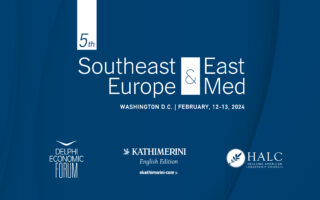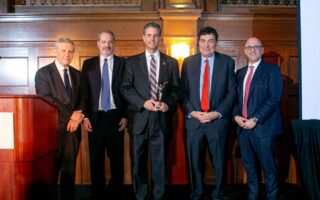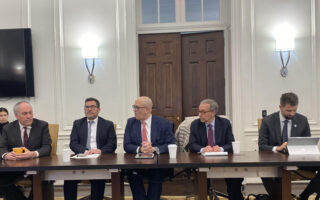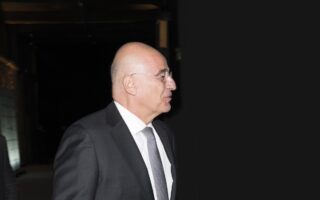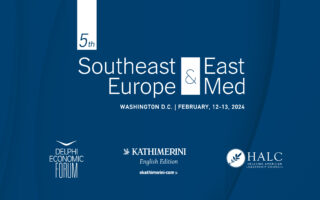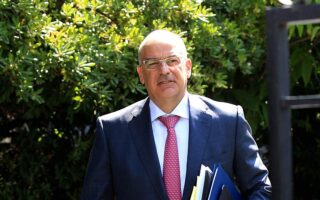US elections will not affect relations with Greece, says official
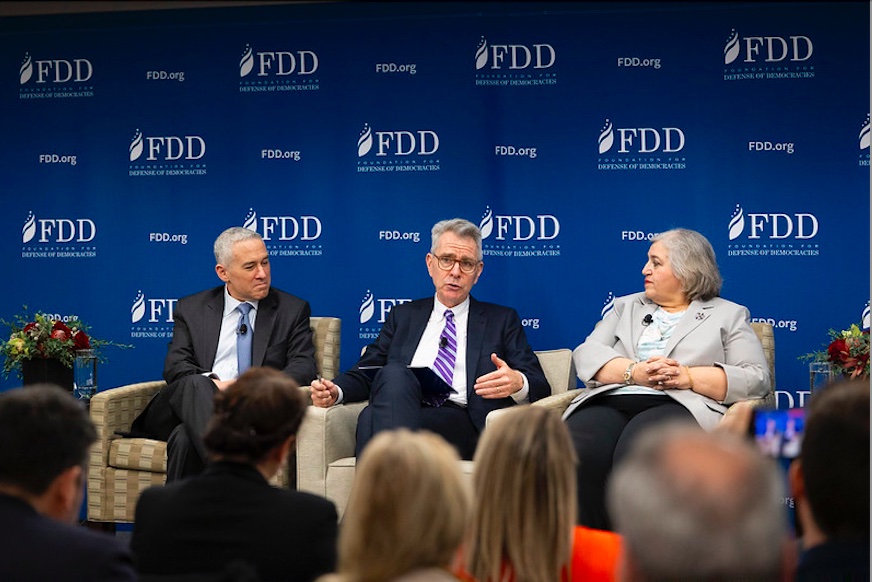
Whatever the result of the US elections in November this year, relations between Washington and Athens will remain strong, US Assistant Secretary of State for Energy Resources Geoffrey Pyatt said during a group discussion at the Foundation for Defense of Democracies (FDD) think tank in Washington, DC on Monday.
The discussion focused on the future of the Eastern Mediterranean, energy cooperation and energy transition, but also the challenges for the security architecture of the region and is part of the 5th Forum for Southeast Europe and the Eastern Mediterranean, co-organized by Kathimerini English Edition, the Delphi Economic Forum, and the Hellenic American Leadership Council (HALC).
Apart from Pyatt, the group included Greece’s Deputy Foreign Minister, Ambassador Alexandra Papadopoulou, the Senior Vice President of the Foundation for Defense of Democracies (FDD) think tank, Jonathan Schanzer, and non-resident Senior Fellow at the FDD, Sinan Ciddi, who focuses on Turkey.
Pyatt noted the deepening of Greece-US cooperation especially in matters of energy, energy transition and security, adding that institutions such as the 3+1 cooperation mechanisms and the East Mediterranean Gas Forum play an important role especially after Hamas’ terror attacks against Israel on October 7.
He also mentioned the India-Middle East-Europe Economic Corridor (IMEC) that will run from India to Europe (aiming to link major ports, including Piraeus), and the upcoming visit of the Greek Prime Minister Kyriakos Mitsotakis to India.
Pyatt also spoke about the inclusion of Greece in the Three Seas Initiative (3SI), but also about the so-called Vertical Corridor, which will supply Central and Southeast Europe with gas from Azerbaijan, transmitted through Greece. As an initiative it will reduce the dependence of the countries of central Europe and the Western Balkans from Russian fuels while accelerating the energy transition in the region, he said. The US official also mentioned his earlier meeting with the Chairman and CEO of Greece’s power utility, PPC, Giorgos Stassis, where they discussed the successful corporate transformation of the company, the new venture in Romania and the acceleration of the integration of renewables in Greece and in the countries of the region.
On her side, Ambassador Alexandra Papadopoulou said that Greece’s relations with the US are at the best level they have ever been, adding that “we share the same values and interests” with the US. She pointed out that Greece is a pillar of stability in the region. “Greece is a stable democracy,” she continued, emphasizing that the country overcame a series of crises by keeping its social fabric and political system intact. Greece’s stability and social cohesion “make the country a reliable interlocutor,” she said, adding that the country has assumed a leading role in the inclusion of Balkan countries in both the EU and NATO. Especially for the Middle East, Papadopoulou said that Greece has a strategic relationship with Israel, but also ties with the Arab countries.
In relation to Turkey, the Deputy Foreign Minister said that Greece does not want to have a large anti-Western country as a neighbor, which is why it is important to keep it as close as possible to NATO policies, but also to maintain its European ambitions. She also reiterated that the only issue up for discussion between Athens and Ankara is the demarcation of the maritime zones, while the Cyprus issue also needs to be resolved.
Jonathan Schnazer said, among other things, that the West needs to start facing reality. “We will not be able to stabilize the region if we do not face challenges,” he said, adding that the war in the Middle East is a regional war since other states such as Iran, Pakistan, and Yemen are involved in different ways. He also expressed the opinion that those challenges are not expected to be faced during pre-election time. Schnazer also spoke about Iran and its domestic situation, while he said that Turkey is a sponsor of terrorist group Hamas.
Sinan Ciddi, said that as a person born in Turkey, he does not recognize where the country is headed. He touched on issues such as Turkey’s attacks on the Syrian Democratic Forces (SDF) in northern Syria, allowing Russian President Vladimir Putin’s oligarchs access to markets, Hamas’ financial needs, and the F-16 fighter jet deal. He also talked about the Russian-made S-400 missile systems that are still in Turkey, adding that the country is building a nuclear plant, fully financed by Russia.
The debate was coordinated by Kathimerini and ERT correspondent, Lena Argiri, while the participants were introduced by HALC’s executive director, Endy Zemenides.
